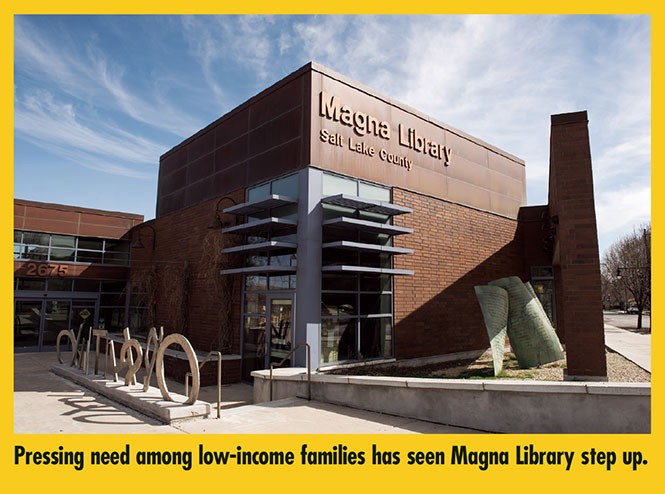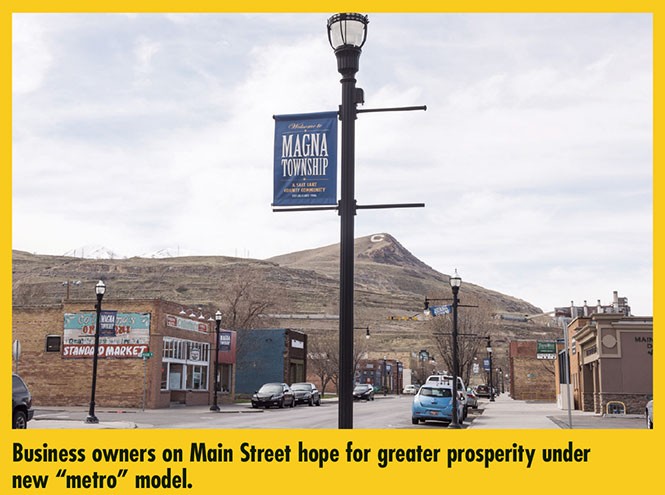Magna Rising
Long burdened by ill health and poverty, a westside community strives to turn the page.
By Stephen Dark @stephenpdarkOnce a week, C.J. Withers—owner of We Witches 3, a spiritual supply store on Main Street in downtown Magna—casts a spell for prosperity.
From her shop's bell-jar-laden shelves, she takes down mint, mandrake, red clover, orange flower and echinacea, and combines them with a mortar and pestle. She then rolls a green candle, first in an oil of her preparation, and then in the crushed herbs. Finally, she sets the herb-crusted candle in sugar "for sweet endings," places it in a small cauldron and lights the wick. "You just let it go," she says.
With just a year and three months on a street that has more than its fair share of empty storefronts, Withers knows she has to be optimistic to see growth in a business that she sank her 401(k) into. With the spell, her intent is "to see everyone be able to progress, to move forward in their businesses," in a community that for outsiders has long been associated through media headlines with drug-related, violent crime.
That image is unfair, say residents and newly appointed deputy chief of police services for Kearns and Magna, Brent Atkinson. Magna's crime level is no different from other Salt Lake Valley communities, Atkinson says, with property crime such as burglaries and car thefts the principal issue. "What drives that is addiction, to get stuff to pawn, to feed their habit," he says.
Atkinson began his law-enforcement career in Magna and now returns to the town full-circle. "What resonates with me is the incredible sense of community pride," he says. That steely pride is something Magna Library manager and recently elected metro township council member Trish Hull traces back through the town's roots. Hull has lived there for 36 years yet still considers herself a newcomer. "Magna has been around since 1850. A lot of people can trace their ancestors back to that time, or when the miners came in the turn of the century," she says. "There's a strong sense of loyalty, of history and love for this community."
Main Street runs from 8400 West to 9200 West, where it abruptly ends at the foot of a mountain. The producers of several TV shows that recently shot series on Main, such as BYUtv's Granite Flats, left behind awnings and freshly painted frontages that reinforce the 1950s charm of some sections of the street. Such cheery facades cement the sense of change in the air, heralded by pennants hanging from lampposts proclaiming Magna's 3-month-old status as a metro township.
In November 2015, Magna, along with four other unincorporated townships that were part of Salt Lake County, voted to become "metros" as the county's Township Executive Rick Graham calls them, or, in essence, municipalities. Millcreek struck a different path, finally becoming the city many had fought for it to be. Magna's sales taxes now flow to a newly established municipal-services district, which pools the townships' taxes to pay for services contracted from Salt Lake County. And its new status grants the town legislative independence through a community-elected five-person council that controls planning, zoning and code-enforcement ordinances. The county council assembled this year's budgets for the townships and Magna and the other metro councils currently are amending those budgets, Graham says.
"We've got good people," Jack Nielsen says of the council. For the past 25 years, Nielsen has owned an industrial repair business at the end of Main, and two bars on the same street. He doesn't take kindly to county interference. "I think, once they get the wheels underneath them, they will tell the county where to pee in the bushes."
But with the prosperity push, there's a part of Magna that struggles to keep up. That's evident in statistics compiled by the Salt Lake County Health Department, which places it as among the unhealthiest communities in the state. According to January 2017 numbers, the population of 28,000 regularly outstrips both Salt Lake County and the state in general in some disturbing categories. These include teen birth rates, asthma, diabetes-related deaths, depression, lung cancer, motor vehicle crashes leading to emergency room visits, obesity, incidences of traumatic brain injury and lower life expectancy.
According to the federal census, 13.5 percent of its residents are below the poverty level, compared to 12.3 percent statewide. While there's a vibrant middle class in Magna, with a string of families that go back to the pioneer days, "the people that need help are probably the most desperate you'll ever run across," Nielsen says. "The economy out here isn't able to generate the number of jobs required to keep everybody happy."
Storm Anderson owns tattoo shop Art on You Studios on the main thoroughfare and is president of Magna's Chamber of Commerce. His wife and co-owner Renee is president of the town council, which oversees two local festivals. In its heyday, Storm Anderson says, people came from across the Salt Lake Valley to enjoy Main Street's string of bars and the hustle-and-bustle of its commerce. "At some point, that began to move out and eventually Main Street became a veritable ghost town, besides some of the bars that helped keep it alive," he says.
The Andersons, who opened their parlor in 2009, have been part of a slow revival of Main Street's fortunes. Economic revitalization promises enhanced sales-tax revenue—with new residential developments, expanding business areas along 3500 South and plans for light industrial development along Highway 201 as Magna's neighbor Kennecott sells off parcels of land. "Magna's at a crossroads, really, whether it becomes a bedroom community or maintains its own identity," says Richard Elliot, publisher of the broadsheet weekly Magna Times. But whether this economic renaissance will also favor the lives of low-income families isolated by Magna's far-west location from vital services, is a question the new metro council will have to address.
"I can't fix people," Hull says, wearing her council hat. "We need to have social services to do that. If you hit rock bottom in this community and want help, there isn't any." Hull frets at the stories the statistics tell, plucking one at random. "Cancer rates are not high but cancer death rates are," she says. "That tells me insurance is an issue. There's a lot of families in the gap who can't get ACA and can't get Medicaid." She keenly feels the weight of representing her community's interests. "Now I'm in the government of Magna, I feel responsibility to this community and we need to see that these services are here," she says.
MOVE A LITTLE CLOSER
Low-income families seeking help have to go to Taylorsville for the Department of Workforce Services (DWS), or else rely on a list of resources prepared by United Way. The Salt Lake City-centric nature of the list floors them. "It's a blow," one advocate says. "You ought to see the look on these people's faces. They want to know where to apply for food stamps, for medical help, they look at that list, and they're awe-struck" at how far they have to go for help.
Elliott says underemployment has long dogged Magna. When DWS had local offices, the former LDS bishop would struggle getting those in need of help to go to the job center. But in November 2013, DWS closed its Magna branch. The department's nearest offices are now 13 miles away in Taylorsville, either 19 minutes by car or over an hour by bus. "I sure wish we had them a lot closer," he says. "I wish we had a voice in that."
In an email response to questions, DWS Communications Director Nate McDonald says research showed the Magna center was "underutilized." An expensive lease and cost-savings of over $330,000 annually, combined with increased use by customers of online resources, were all factors in the state's decision.
Hull says that while DWS' Magna customers might be using their online services, many are doing so on the library's computers. "DWS has awesome services, but they don't do outreach. Adults come in to use computers to apply for jobs and benefits. We help them with banking and getting their W-2s off the internet."
Several people City Weekly spoke to lamented the loss of DWS, recalling how, at 7 a.m. when it opened, the line for help with case reviews, employment evaluations, job skill tests and benefits eligibility was out the door.
STEPPING UP
If state agencies are geographically inaccessible for families without cars, true to its working-class roots, Magna works hard to support its own.
Amid the small-town storefronts that populate Main, the letters of Magna FACT stand out on one window. FACT, which stands for Family, Agencies, Community Together, is a 10-year-old nonprofit that serves the area's low-income families.
It's best known for its annual Sub-for-Santa, which last year saw 59 kids get a mode of transportation—a bicycle, tricycle or scooter—a coat, a pair of shoes, two outfits, underwear and socks. FACT is open Monday through Thursday, from 1-4 p.m. In just the first week of March, says Assistant Director Andrea Boone, who relies on a walker to get around, "I've seen everyone from people seeking employment and wanting to know if we had shoes and clothes, to seeking transportation assistance to get to a mental health meeting downtown. Six or seven families in the last three days needed food."
Boone says she refers many of her clients to counselors at The Road Home shelter in downtown Salt Lake City and used to give out bus tokens, until she saw people selling them across the street.
One option for free food in Magna is Salt Lake Community Action Program's office in a strip mall on the corner of 8400 West and 3500 South. It's open three afternoons a week and serves 60-80 individuals or families a week. They're allowed one visit a month to fill a shopping cart with groceries from the pantry shelves. Clients include a number of homeless individuals and couples living in cars, along with the occasional influx of the homeless from downtown Salt Lake City.
CHURCHES ON MAIN
County statistics that highlighted Magna's many troubling physical and mental health problems prompted the creation of volunteer-manned Magna in Motion. Founded in 2014, the organization seeks to combat diabetes and obesity (35.7 percent of Magna's adults are obese, compared to 26.6 percent in the county) with exercise programs, such as walking up a steep hill.
"That's a real calorie-burner," chair Keri Duckworth says. Fellow volunteer Jennifer Gordon says, in total, participants lost 695 pounds in two years. As welfare funding has dried up, "What are low-income people supposed to do?" Gordon asks. "That's why we're trying to educate people that it's free to do a jumping jack outside. We figure if we change two or five people at a time, that's where you have to start."
Exodus Healthcare Network, the only health clinic in town, also pitches in by running free pre-diabetes and tobacco-cessation programs with federal and state partners. While private, it offers a sliding-scale for the 12.6 percent of Magna residents who are uninsured. Otherwise, residents would be forced to go to one of the free clinics in Salt Lake City or Midvale. Still, a single mother, packing groceries from the CAP food pantry into the back of her SUV, notes that a visit to Exodus without health insurance costs her $130—a price that will surely deter future visits, she says.
Half a dozen churches dot Main Street, mostly a few blocks east of Art on You and We Witches 3. Several of the churches provide some form of welfare support to congregants.
Some argue the surprising number of houses of worship reflects the collapse in median income Magna has experienced in recent decades. "Churches are the main indicator of a bad economy," Nielsen says. "They get the building cheap and the tax structure is cheap. It's a really good area for them to thrive in."
That's led to lots of jokes, Anderson says, about "indulging your carnal interests on a Saturday night and then spending Sunday morning repenting at the church across the street." He admits to frustration with the churches, given that their tax-exempt status means they don't contribute taxes to the business district.
Elliott disagrees. "I think the reason there's a lot of those churches there is low rent. I don't think it hurts economic growth as much as people might think. It beats having empty storefronts as far as I'm concerned."
He doubts Main Street "will ever be an economic engine. It's going to be boutiques at best," bringing charm and quality of life to Magna but not necessarily much-needed sales taxes. He looks to a new Holiday gas station and an expected new Maverick on 7200 South as being the kind of engines for sales-tax collection that'll power Magna to the point where it can become a city.
KIDS GOING HUNGRY
One of council member Hull's biggest concerns is the impact of poverty on the children she sees while working her daytime job as Magna Library's manager. When the county moved the library from the business district on 3500 South to an $8.5-million Main Street building five years ago, she noticed an unexpected uptick in the number of children coming to her branch.
Every day after school, kids would come and stay on the facility's 30 computers until the 9 p.m. closing time. During the summers, she says 50-60 kids would come in at 10 a.m., some who had had nothing to eat. They would have to wait till late afternoon to get snacks provided by the Utah Food Bank.
"My kids wouldn't spend eight hours at a library, but, for these kids, that's the best place they can be," she says. "We feed them; sometimes that's the only meal they get. To me that means there is a problem."
Cyprus High School Principal Robert E. McDaniel says his biggest challenges are attendance and apathy. Three out of four students graduate, which puts the school 5 percent behind the state average. That lack of graduation ties into attendance issues through elementary and middle school, he says.
McDaniel estimates that marijuana is the drug of choice for around 10 percent of his students, although typically they are non-attendees. "Kids would say it's higher. There definitely needs to be more programs for teenagers to keep kids off the streets," he adds. "Idle time kills teenagers."
One bright spot that Hull highlights is Magna United, a collaboration between local government agencies, community partners and school administrators to provide kids and their relatives access to services. Run by Salt Lake County's Youth Services Afterschool Program Manager Danielle Latta, it was started in 2012 through a $450,000 federal grant to Magna schools.
Salt Lake County's Youth Services "really stepped up," Hull says. "They've written some grants, and now every school has an afterschool program, homework help, enrichment and a meal until the parents get there."
Those services, however, are under threat. President Donald Trump's proposed budget includes gutting those 21st-century grants—"the only service in Magna that is working," Hull says.
THE SUBOXONE MAZE
While resources, at least for now, are being directed at Magna's children, "when it comes to adults, if they want to try to improve their lives, sometimes it's tough to get the help they need," Hull says.
As Magna Library manager, she tried to address that disparity in 2016 by bringing in South Valley Services, a spinoff from the domestic violence shelter South Valley. They provide a case manager each Wednesday afternoon for a few hours—a service six other county libraries use. South Valley's Morgan Bodily says they offer employment and clothing referrals, help with getting financial assistance and heat programs, along with referrals to dental clinics and free- and low-cost health care. A flyer posted in the library also lists legal services, parenting classes and resources for basic needs and family violence.
Drug addiction inevitably also forms a part of the laundry list of needs facing Magna's council in coming months. One recovering addict agreed to share her thoughts if granted anonymity. She used heroin and meth for years and says one Magna doctor, at Exodus, prescribes suboxone—medication similar to methadone—as long as you don't relapse. To fill her prescription, she has to travel for two hours by bus to a Salt Lake City clinic every day. "It's an all-day thing," she says. "There's no way to have a job, no way to take care of a kid." And the journey's even longer if the bus is late or she misses one of her transfers.
The complexity of applying for suboxone "is such a maze. It's a joke, especially when you're withdrawing from heroin," she says. "It's a process that takes far too long with not nearly enough help coming in." She advocates for a methadone or suboxone clinic on the west side "because there's a whole bunch of drug addicts out here and the biggest problem is getting there." Then there's the cost—whether it's $50 a day or $50 a week, she says, "either way it might as well be $1,000 because, for an addict, nothing is still nothing." She links the high rates of teen pregnancies with multigenerational addiction. "People raised by addicts, turned into addicts, depressed their whole family is an addict—that's just how this town is."
Magna Times' Elliott agrees that the distance to travel for methadone or suboxone is an issue. "The people who need it the most have the least access to it, at least from our point of view in Magna." He hopes the council "will lobby for a fair shake of social services that Trish talks about. You've got to go after those aggressively. It feels like we're an afterthought."
Hull says her dream is to have a space on Main Street where, one day a week, drug rehab, free health and dental care and Workforce Services roll into town.
She says Magna "has a lot of potential right now." She wants people to think better of her hometown, to "understand what a great place it is, that it has a lot of diversity." All that's missing is the services. "We deserve to have them in our town," she says. "We shouldn't be forcing people to leave our community to find them."
DUCKLING TO SWAN
High above Magna is the wind-swept Pleasant Green Cemetery, which dates back to 1883. Elegant, gated plots tell the stories of Magna's royalty, its multigenerational families. Other graves carry no name but rather a sun-bleached photo of a loved one, or just a beaten whirligig rattling in the breeze.
Look down on the township and you see subdivisions of large houses similar to ones you find in West Jordan or Sandy. In the distance, along 8400 West, trucks thunder north up the narrow street toward Kennecott, a reminder of yet another statistic that Magna unfortunately tops the state in: It's almost a third higher than the number of Salt Lake County's motor vehicle crash-related emergency department visits. Magna stands at 126.1 per 10,000, while the county is at 92. One mother at the library's afternoon snack hour pleads for a safer crosswalk on 8400 West by the recreation center. "People don't stop," she says.
Storm Anderson ties the town's future to economic development, hoping for a time when "median income rises and the quality of health overall improves. I think they are directly correlated to one another. As one improves, so will the other." Part of the fight of restoring Magna to its former glory involves coaxing casual-dining restaurants to town, such as Olive Garden, Red Lobster and Chili's, he says. The problem is that the town's demographics at the moment lure only McDonald's, Arby's and other fast-food franchises, which worsen rather than improve the town's health issues.
While several women getting goods at one of the two local food pantries cite a need for more low-income housing and daycare, Anderson wants to see affordable long-term, single-family homes with a $200,000-plus price tag for people who can afford to dine at an establishment like Olive Garden. "I want people with disposable income supporting Magna Main, people who sit out here long-term while raising children, rather than first-time renters who come and go."
Nielsen shares Anderson's optimism, particularly now that the metro township council has officially taken control. "At least something has changed. We were the unknown ugly step-child of the county; the only time [the county] gives a shit about us is election time," he says. "Now we have people on the chamber, on the township council who live here. They're part of the solution."
We Witches 3 owner Withers says she took "a leap of faith" to open her store. A former EMT, she took on the venture in part to support her daughter, a practising witch, only for the latter to fall in love and move to North Carolina, from where she conducts tarot readings via Skype. With Magna claiming a large Wiccan and pagan community, Withers says, during the first year, they "did a hell of a lot better than I expected."
Withers aims to keep prices low, she says, because of the poverty around her. She talks about one woman who brought in a stone from her garden which she offered in exchange for several necklaces. The stone turned out to be worth more than the necklaces the woman got. When she offered her additional recompense, she turned it down. "They don't want handouts," Withers says admiringly. "They want to make it on their own."
More by Stephen Dark
-
Call it a Comeback
Long mired in economic depression, Midvale’s Main Street dusts off its small-town charm.
- Sep 20, 2017
-
Love Letters
Correspondence between a young woman at the Topaz internment camp and her beloved sheds light on Trump's America.
- Sep 6, 2017
-
Triggered
Veterans Affairs exists to help vets. So why did the Salt Lake VA appoint an anti-veteran chief?
- Aug 30, 2017
- More »
Latest in Cover Story
Readers also liked…
-
Forget the family pedigree—Robert F. Kennedy Jr should not be the next president of the United States
Trojan Horse
- Jun 21, 2023
-
Women decry harassment and toxic culture at St. George auto dealership
Men at Work
- Oct 11, 2023
















